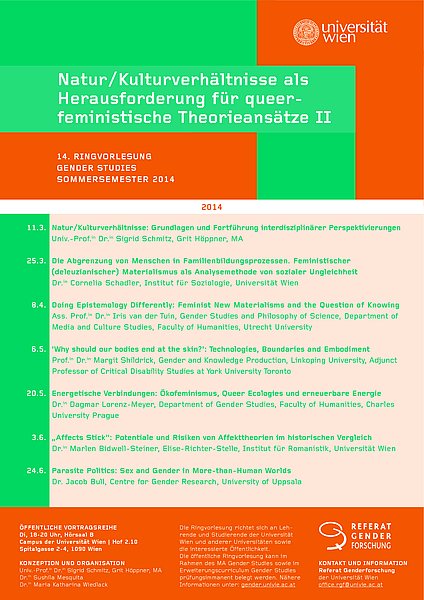Dienstag, 24. Juni 2014, 18:00 - 20:00 iCal
Sex and Gender in More-than-Human Worlds
Jacob Bull: Parasite Politics
Hörsaal B, Campus der Universität Wien, Hof 2
Spitalgasse 2-4, 1090 Wien
Vortrag
Symbiosis has disciplinary heritages across the humanities and social sciences it is however, most often associated with biological understandings of life. By attending to the close associations between dissimilar organisms, symbiosis and symbiogenesis has revolutionised understandings of the origins, development and constitution of life. Symbiosis by emphasising the interactions and codependencies between beings challenges the notions of the individual at every scale from the processes of evolution to the moments of everyday life. Recently, feminist and gender scholars such as Haraway (2003;2008) and Hird (2009), have engaged the concept of symbiosis to rework, rethink and build on existing understandings of our seemingly human social worlds.
As we continue to analyse what Whatmore (2002) calls our ‘more-than-human’ worlds, we must recognise that as Haraway (2003) observes ‘beings do not pre-exist their relating’ and that not all beings are human. The greater emphasis on the intertwining of ‘human’ and ‘more-than-human’ has led authors such as Butler (2004) to observe that questions of gender are increasingly tied to questions of ‘humanity’. As we consider the animal and technological webs that synthesis hormones and other medical products, produce cosmetics, food, or clothing and allow ‘us’ to physically and immunologically develop, symbiosis theory becomes an attractive paradigm for understanding the creation of the human subject. It offers a framework for analysing the emergence of ‘the human’ and all it’s sexed, gendered, classed and raced specificities.
Theories of symbiosis and symbiogenisis have been used to question the very foundations of sexual difference by challenging the normative assumptions of reproduction as a driving force within evolution (Hird, 2012). The undeniable importance of symbiotic relationships and horizontal gene transfer between beings in their relating all of which are not sexual, nor reliant on sex(ual) or gender differences, raise questions over the relevance of gender perspectives. However the connections between gender theory and symbiosis have hitherto focussed on relationships of creative dependency or indifferent relations between human and more-than-human elements; beings we do not mind sharing our social worlds with. But what of those animals we do not want to share our worlds with? What do parasites do in the meeting of Symbiosis and Gender theory?
Jacob Bull is a social and cultural geographer, based at the Centre for Gender Research, Uppsala University, Sweden. He has previously conducted research on cultures and practices of recreational fishing, and worked on the EU Welfare Quality Programme. More recently he has explored issues around gender and animals in Dairy farming and his current project brings animal studies perspectives to encounters with parasites. In particular it examines the various positions, roles and actions of ticks in our more-than-human worlds. Outside of university life, Jacob shares his life with bees.
Zur Webseite der Veranstaltung
Veranstalter
Referat Genderforschung der Universität Wien
Kontakt
Grit Höppner
Professur Gender Studies, Universität Wien
+43-1-4277-495-91
grit.hoeppner@univie.ac.at
Erstellt am Mittwoch, 05. M�rz 2014, 11:17
Letzte Änderung am Montag, 16. Juni 2014, 11:12

